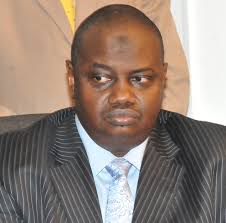December 9 is the International Anti-Corruption Day. This year’s edition was marked in Abuja with civil rights groups in attendance. At the event, groups stakeholders brainstormed on how to fight corruption in the society. Senior Correspondent, JUDE KENNETH reports…

Tuesday, December 9, 2014 was the International Anti-Corruption Day. The date is internationally set aside every year to create awareness and re-state commitment to the fight against corruption.
In Abuja, the nation’s capital, some civil rights organisations and agencies such as Nigeria Extractive Industries Transparency Initiative (NEITI), Fiscal Responsibility Commission, Technical Unit on Governance and Anti-corruption Reform, and Independent Corrupt Practices and other related offences Commission (ICPC), among others gathered at the National Centre for Women Development, Abuja, with the theme: ‘Break the Corruption Chain’ to mark the day.
The event, which was organised under the auspices of Inter-Agency Task Team (IATT) had in attendance the executive chairman of the Economic and Financial Crimes Commission (EFCC), Ibrahim Lamorde, who solicited the support and cooperation of Nigerians in the fight against corruption, stating that “the job of fighting corruption should not be left only to statutory organisations”.
Lamorde disclosed that the Commission had been deploying the social media platforms to reach the public, adding that the fight against corruption could not be fought only by traditional model of public enlightenment. He said the Commission had developed a state-of-the-art forensic laboratory, which deals with all types of analysis in the fight against corruption.
“We have trained a lot of analysts and financial crimes investigators who specialise in modern techniques of identifying frauds,” he said.
Also speaking at the event, chairman IATT, Ledum Mitee, emphasised the need to empower the anti-corruption institutions with the necessary resources to confront corruption.
Citing the Jakarta Principles for Anti-Corruption, which includes remuneration, authority over human resources, adequate and reliable resources as well as financial autonomy, he expressed doubt that the anti-corruption agencies in Nigeria meet the standards.
Mitee posited that if Nigeria was to make significant progress on developmental issues, it must break the corruption chain by reducing corruption to the minimum.
He also called for the effective implementation of laws at all levels of governance without fear or favour, saying: “Not only must there be no sacred cows and the culture of impunity wiped out, but the replication of anti-corruption measures and institutions at the sub-national levels must be seen as a priority.”
In his contribution, Bala Sanga, from the United Nations Office on Drugs and Crime (UNODC), stressed that corruption can weaken governance, which in turn could fuel organised crimes, including human trafficking, money laundering, terrorism and other forms of criminality.
While pledging the support of UNODC to eliminate corruption, Sanga disclosed that the UNODC had just started the implementation of 34.5 million euros project funded by the European Union (EU) to assist anti-corruption agencies, the police, the judiciary and civil society organisations.
A Public Complaints Commission representative, Obunike Olaegbu, who graced the event, advised the EFCC, ICPC and other anti-corruption agencies to do more in the area of enlightenment and sensitisation of the public on the ills of corruption.
Also, Kolade Omoyola, representative of the Code of Conduct Bureau (CCB), urged Nigerians to declare their assets, stating that the Bureau was doing its best to break the chain of corruption through public enlightenment.
Chairman of National Human Rights Commission (NHRC), Chidi Odinkalu, who gave the keynote address, charged leaders who are nonchalant about fighting corruption to have a rethink.
“I do not congratulate people on erecting buildings, but I ask what they have done to build our values,” he said.
The highlight of the commemorative event was the unveiling of the Inter-faith Anti-Corruption Manuals – teaching aid for both Christians and Muslims.
While unveiling the manuals titled, We Can Fight Corruption with Religion, Lamorde said: “The public unveiling of the inter-faith manuals is only one stage in a long process that also includes the training of those who are expected to put it to use – the faith leaders, women and youths. Along with the committee, the Commission will organise workshops in the six geo-political zones, using the manuals to build relevant local capacity critical for an effective war on corruption.”




